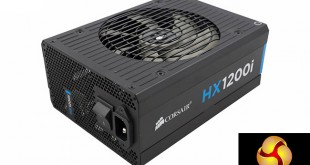
Today we take a look at one of the latest Corsair power supplies – the fully modular HX 1200i. This new power supply has been created with high efficiency and low noise emissions in mind. It will slot in above the HX1000i that we reviewed back in August last year as the flagship model in this specific range. At £199.99 inc vat should this be shortlisted for a new system build this year?
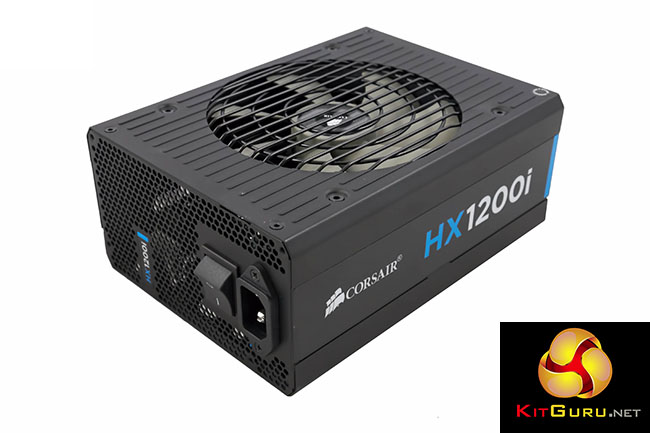
The HXi power supplies are all Platinum class with an efficiency rating of at least 92% at 50% load. There are already three power supplies from Corsair available in this range: a 750W, 850W and 1000W model. This new 1200 watt model claims flagship status.
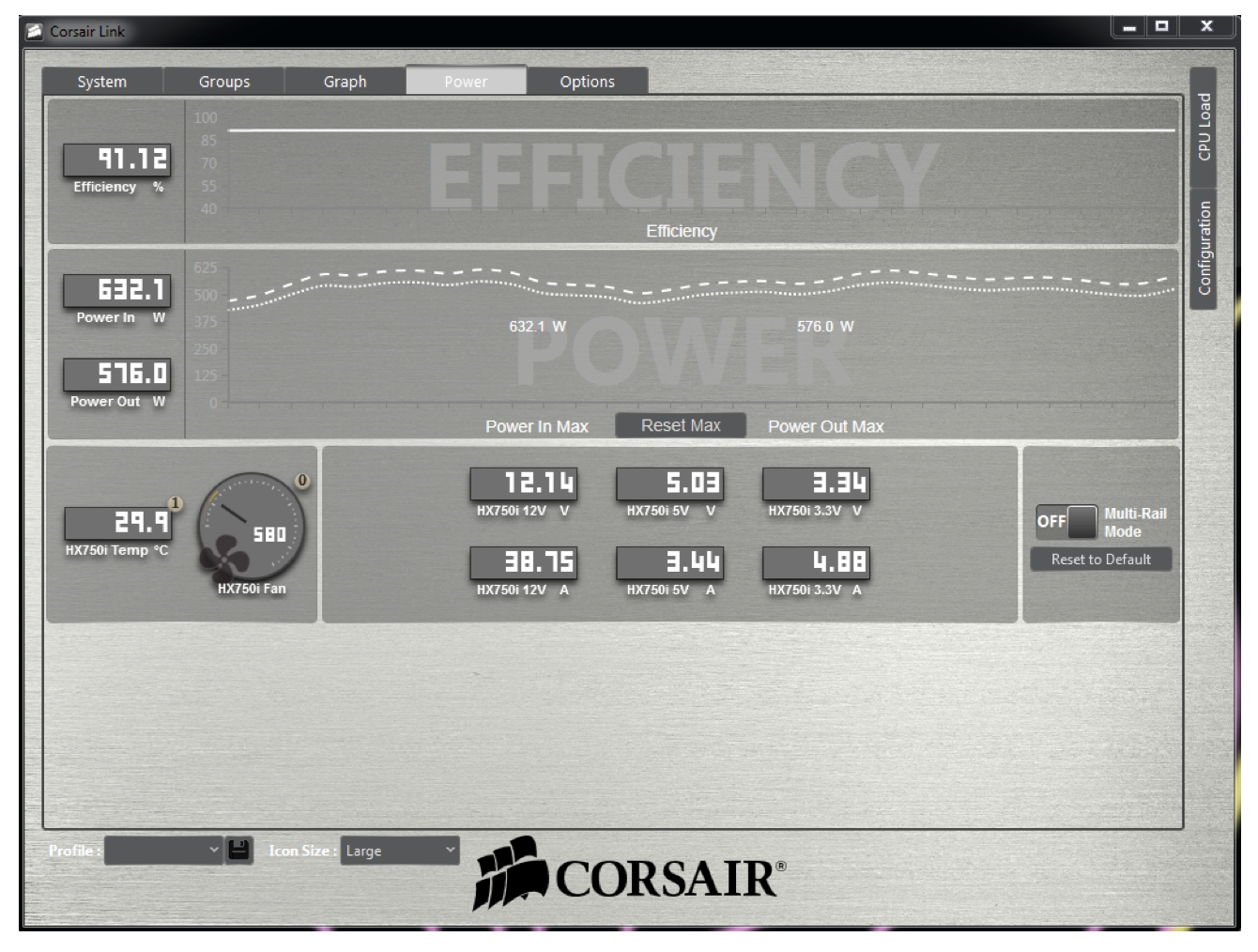
The HXi is an analog power supply but it features a built in analog to digital bridge which can pass over information to the Corsair Link Software via a USB connection. As the image above shows, the end user can monitor fan speed, current and voltage of the +3.3V, +5V and +12V rails. There is also support for display power in and efficiency, monitor power out with the option to enable or disable OCP on the +12V rails.
Corsair say they have carefully selected every component in the creation of the HXi to eliminate noise. They have placed special effort into improving the windings of transformers/coils in the design. Vibrations can occur if components are not wound properly – leading to what many users are calling ‘coil whine’. A fairly common problem with some power supplies on the market, even today.
Corsair seem confident in the new design – they are offering a full 7 year warranty with the HXi power supplies.
Corsair HX1200i Features:
- Corsair Link™ Integration for monitoring performance and adjustment of fan speed and multi-rail/single rail mode.
- 80 PLUS® Platinum efficiency, delivering 92% energy efficiency at real world load conditions.
- ZeroRPM mode for fanless operation at low loads and outstanding noise reduction.
- 140mm thermally controlled fluid dynamic bearing fan spins up as needed.
- Fully Modular low profile cables for easy installation, less clutter, and helps maximize airflow through your computer’s chassis.
- Engineered to meet maximum power output at a server-grade 50C temperature rating.
- Fan self-test switch to determine fan functionality even before installation.
- The latest ATX12V v2.4 and EPS 2.92 standards and is backward compatible with ATX12V 2.2, 2.31 and ATX12V 2.01 systems.
- 4th generation Intel® Core™ processor Ready (Intel Haswell and Z87 motherboards).
- Over-voltage protection, under-voltage protection, and short circuit protection, over power protection, over temperature protection provide maximum safety to your critical system components.
- Safety and Agency Approvals: FCC, ICES, CE, UL / CUL, CSA, C-Tick/RCM, TUV, CB, CU, KC Mark, RoHS, WEEE, RoHS (China), REACH
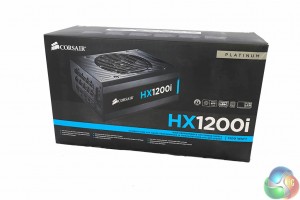
Corsair have not changed their box artwork in the last year – we do like their styling and the effective, yet simplistic two tone nature of their designs.
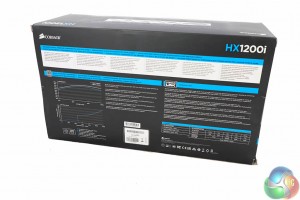
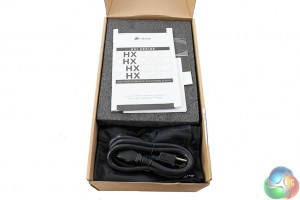
The Corsair HX1200i power supply ships protected inside thick slabs of foam, with the accessories shipping in a separate section of the box.
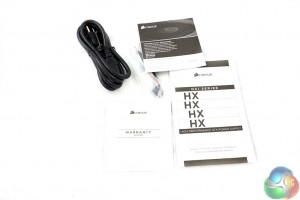
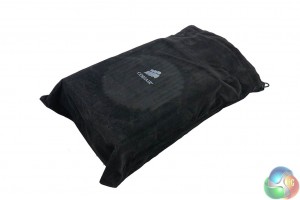
Corsair include a regional specific power cable, a user manual, some literature and mounting screws. The power supply itself is wrapped inside a soft felt bag.
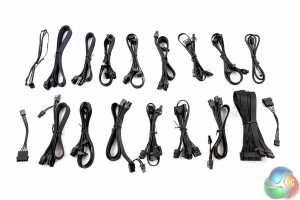
This power supply is a fully (pure) modular design, so no cables are hardwired into the chassis. The cables are all high grade flat ‘ribbon' style to aid the routing process during the build phase. Even the primary MB 20+4 is an easy to route cable.
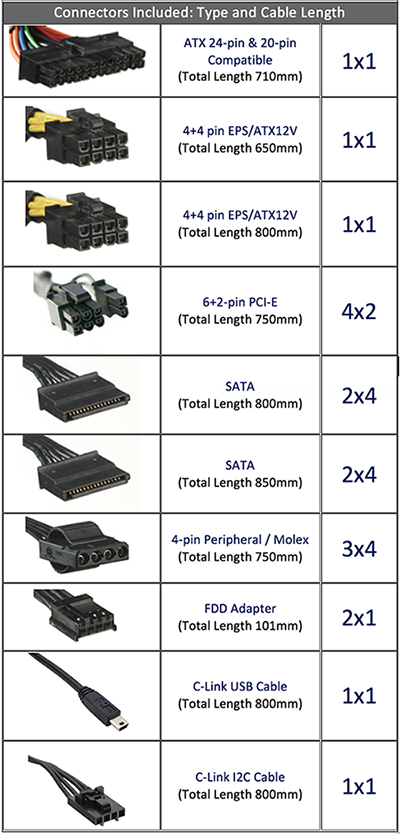
The Corsair HX1200i has a total of 8 PCIe connectors available – for those running high end SLI and Crossfire configurations. The lower power 750W and 850W HXi models sacrifice two of these connectors. The cable configuration is identical actually to the HX1000i model, with the exception of 16 SATA cables (HX1000i has 12 in total).
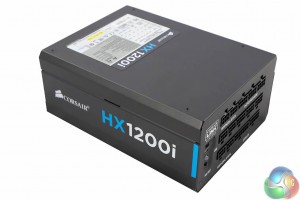
We have always admired the build quality of the high end, expensive Corsair power supplies. The HX1200i thankfully doesn't break the mould.
The HX1200i passed our ‘screwdriver' test without a hitch. This involves running the head of a Philips head driver down the side of the chassis with light to medium force. The paintwork stood up to the stress test. After all, how many times have you accidentally connected with a power supply during a system build?
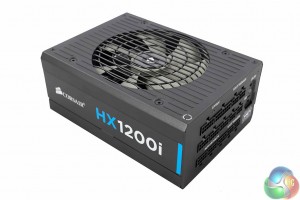
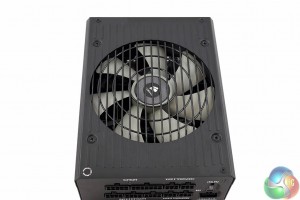
The light coloured fan is visible behind the black bars of the grill. Corsair branded can be seen in the center.
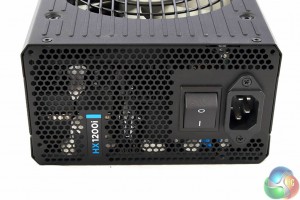
One side of the power supply is almost completely vented to ensure there is adequate air flow. Corsair claim that under most circumstances (40% power draw) the fan will be running in ‘Zero RPM mode' – which is around 480 watts in the case of this 1200 watt unit.
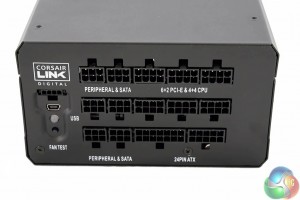
The modular panel is staggered in three rows. Six 8 pin modular connectors support either CPU power connectors (4pin ATX12V or 8 pin EPS12V) or PCIe power connectors (6+2 pin). Four 6 pin connectors support either SATA or MOLEX power connectors. The 24 pin ATX power connector is plugged into the modular interface using two separate connectors.
The Corsair Digital Link connector works with the Corsair Link software using either a mini USB connector or a I2C connector.
The fan test button is included so the user can check the fan is still operational – useful as most of the time it will not be running at all. The LED turns green when the USB header is connected and the power supply is functioning properly. When the link is active, the lights will rotate between green and red colours. If it holds a solid red, it has lost connectivity completely.
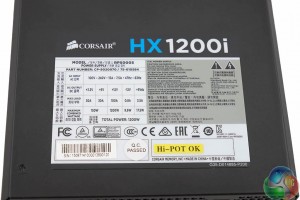
| Corsair HX1200i Platinum Modular PSU | |||||
|
DC Output
|
+3.3V
|
+5V
|
+12V |
-12V
|
+5Vsb
|
|
Max Output
|
30A
|
30A
|
100A |
0.8A
|
3.5A
|
| Total Power | 150W | 1200W | 9.6W | 17.5W | |
| 1200W | |||||
The Corsair HX1200i Platinum Modular power supply can deliver 100A via the +12V rail. It can deliver all of its available power across the +12V rail.
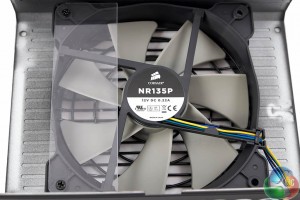
Corsair are using the NR135P power supply fan inside the HX1200i – the exact same fan fitted inside the HX1000i.
Corsair say this fan was designed with blades shaped to move more air while creating less noise. The blades are balanced to help prevent resonance at higher spin speeds. This fan is a fluid dynamic bearing design, superior to most sleeve or ball bearing units on the market. Corsair have enhanced the motor core and windings in the bearing for better low noise performance at reduced speeds.
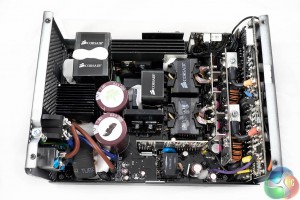
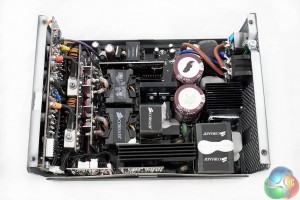
This is a CWT design, as we expected. Soldering quality is very high throughout and it is a very clean overall build from CWT focusing on attention to detail.
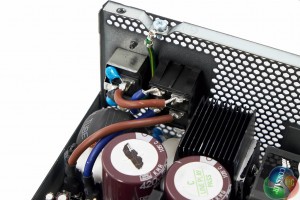
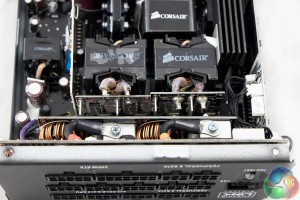
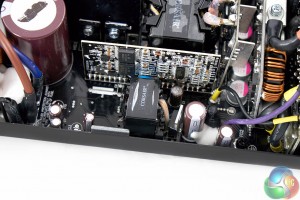
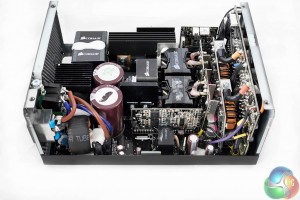
Two Y capacitors start the AC line filter in this supply. There are 4 more capacitors, three X caps, two coils and a TVS diode on the line filtering. A voltage regulator module controls the 3.3V and 5V output. We noticed Corsair are using Apaq and Enesol Polymer capacitors. Electrolytic capacitors are all Japanese – from Nippon Chemi Con and Rubycon.
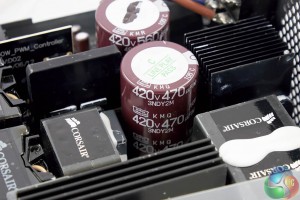
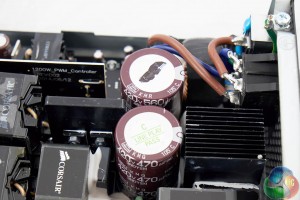
The primary stage capacitors are high grade 105C rated, from renowned Japanese company Nippon Chemi Con. Corsair are using two capacitors in the primary stage – 1x 420v 470uF and 1x 420v 560uF. These are from the KMQ and KMR families respectively. Corsair use 2x 105c 400v 470uF Rubycon capacitors in the HX1000i model. Both Rubycon and Nippon Chemi Con rate equally good, in our experiences over the years anyway.On this page we present some high resolution images of the product taken in our professional studio. These will take much longer to open due to the dimensions, especially on slower connections. If you use these pictures on another site or publication, please credit Kitguru.net as the owner/source.
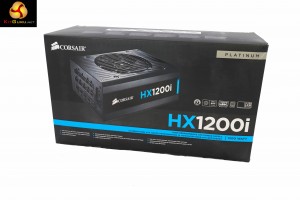
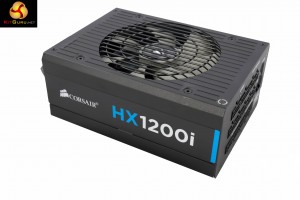
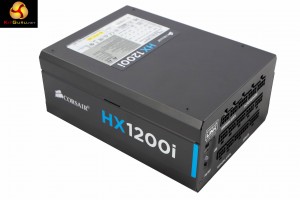
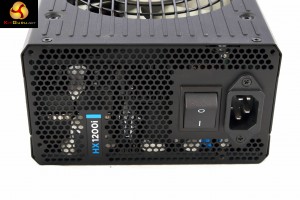
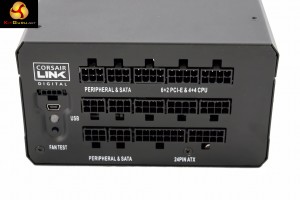
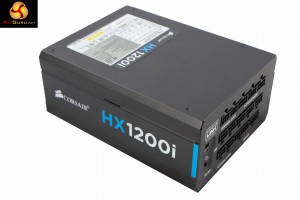
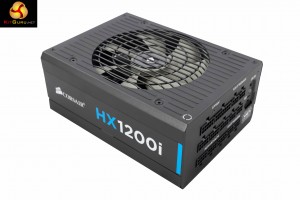
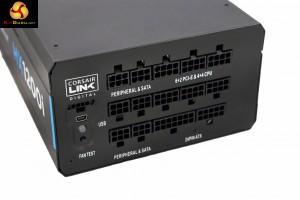
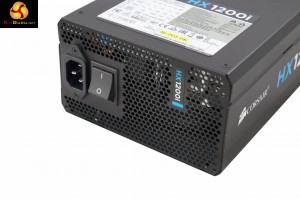
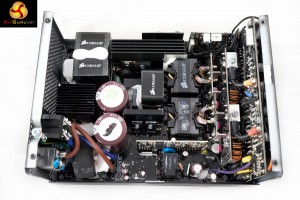
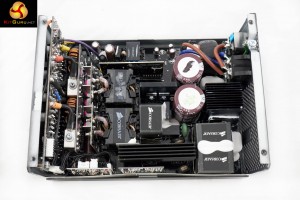
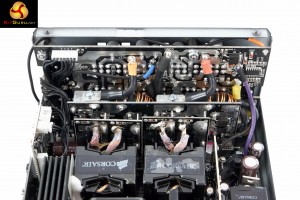
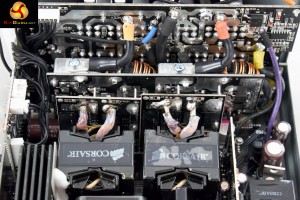
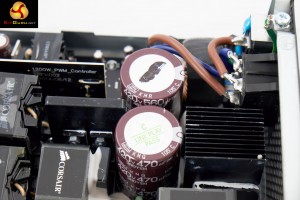
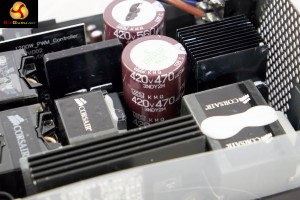
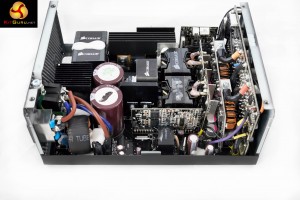
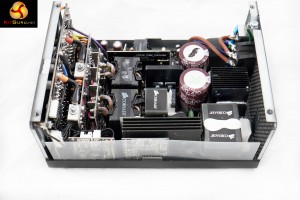
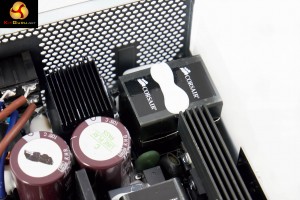
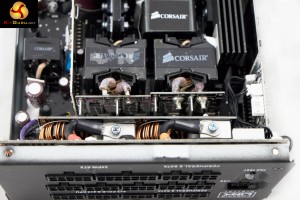
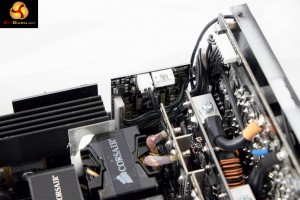
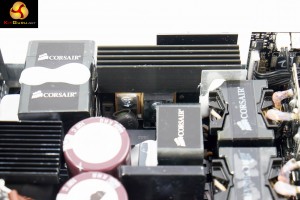
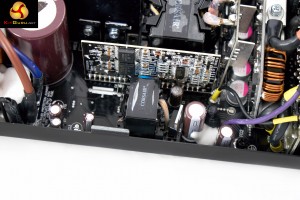
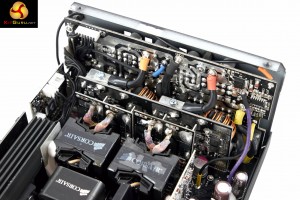
Additional technical assistance: Peter McFarland and Jeremy Price.
Correctly testing power supplies is a complex procedure and KitGuru have configured a test bench which can deliver up to a 2,000 watt DC load. Due to public requests we have changed our temperature settings – previously we rated with ambient temperatures at 25C, we have increased ambient temperatures by 10c (to 35c) in our environment to greater reflect warmer internal chassis conditions.
We use combinations of the following hardware:
• SunMoon SM-268
• CSI3710A Programmable DC load (+3.3V and +5V outputs)
• CSI3711A Programmable DC load (+12V1, +12V2, +12V3, and +12V4)
• Extech Power Analyzer
• Extech MultiMaster MM570 digital multimeter
• SkyTronic DSL 2 Digital Sound Level Meter (6-130dBa)
• Digital oscilloscope (20M S/s with 12 Bit ADC)
• Variable Autotransformer, 1.4 KVA
|
DC Output Load Regulation
|
||||||||||
|
Combined DC Load |
+3.3V
|
+5V
|
+12V
|
+5VSB
|
-12V | |||||
|
A
|
V
|
A
|
V
|
A
|
V
|
A
|
V
|
A | V | |
|
100W
|
1.55
|
3.34
|
1.75
|
5.05
|
6.65
|
12.22
|
0.50
|
5.02
|
0.20
|
-12.07
|
|
200W
|
3.13
|
3.34
|
3.50
|
5.05
|
13.50
|
12.18
|
1.00
|
5.02
|
0.20
|
-12.07
|
| 400W |
6.40
|
3.33
|
7.05
|
5.04
|
27.50
|
12.14
|
1.50
|
5.02
|
0.30
|
-12.07
|
| 600W |
9.80
|
3.33
|
10.77
|
5.04
|
41.70
|
12.12
|
2.00
|
5.01
|
0.30
|
-12.07
|
|
800W
|
13.25
|
3.33
|
14.55
|
5.04
|
56.40
|
12.08
|
2.50
|
5.01
|
0.50
|
-12.08
|
| 1000W | 16.55 | 3.32 | 15.75 | 5.03 | 71.40 | 12.06 | 3.00 | 5.01 | 0.60 | -12.08 |
| 1200W | 22.01 | 3.32 | 22.01 | 5.00 | 85.00 | 12.02 | 3.60 | 5.00 | 0.80 | -12.08 |
Load regulation is very good indeed, holding within 2%.
| Corsair HX1200i | Maximum Load |
| 1344 Watts |
We managed to get another 144 watts from the power supply before the protection circuitry kicked in. The supply was undamaged and it was ready to fire up again when we dropped the load to a more realistic level.
Next we want to try Cross Loading. This basically means loads which are not balanced. If a PC for instance needs 500W on the +12V outputs but something like 30W via the combined 3.3V and +5V outputs then the voltage regulation can fluctuate badly.
| Cross Load Testing | +3.3V | +5V | +12V | -12V | +5VSB | |||||
| A | V | A | V | A | V | A | V | A | V | |
| 1190W | 4.0 | 3.34 | 3.0 | 5.05 | 88.0 | 12.00 | 0.2 | -12.04 | 0.50 | 5.01 |
| 240W | 19.0 | 3.33 | 22.0 | 4.99 | 2.5 | 12.15 | 0.2 | -12.03 | 0.50 | 5.00 |
The Corsair HX1200i power supply delivered a great set of results in the demanding Cross load test, as shown above.
We then used an oscilloscope to measure AC ripple and noise present on the DC outputs. We set the oscilloscope time base to check for AC ripple at both high and low ends of the spectrum. ATX12V V2.2 specification for DC output ripple and noise is defined in the ATX 12V power supply design guide.
|
ATX12V Ver 2.2 Noise/Ripple Tolerance
|
|
|
Output
|
Ripple (mV p-p)
|
|
+3.3V
|
50
|
|
+5V
|
50
|
|
+12V1
|
120
|
|
+12V2
|
120
|
|
-12V
|
120
|
|
+5VSB
|
50
|
Obviously when measuring AC noise and ripple on the DC outputs the cleaner (less recorded) means we have a better end result. We measured this AC signal amplitude to see how closely the unit complied with the ATX standard.
| AC Ripple (mV p-p) | ||||
| DC Load | +3.3V | +5V | +12V | 5VSB |
| 100W | 10 | 10 | 15 | 5 |
| 200W | 15 | 10 | 15 | 10 |
| 400W | 15 | 10 | 15 | 10 |
| 600W | 15 | 10 | 20 | 10 |
| 800W | 15 | 10 | 25 | 15 |
| 1000W | 15 | 15 | 30 | 15 |
| 1200W | 15 | 15 | 30 | 20 |
Fantastic results – all rails hold well within the industry rated tolerance levels.
|
Efficiency (%)
|
|
|
100W
|
85.8
|
|
200W
|
88.9
|
|
400W
|
93.0
|
|
600W
|
94.1
|
|
800W
|
93.8
|
| 1000W | 92.6 |
| 1200W | 92.2 |
The overall efficiency results are excellent, peaking at 94.1% at 600W. This drops to 92.4% efficiency at full load, a very impressive result overall.
We take the issue of noise very seriously at KitGuru and this is why we have built a special home brew system as a reference point when we test noise levels of various components. Why do this? Well this means we can eliminate secondary noise pollution in the test room and concentrate on components we are testing. It also brings us slightly closer to industry standards, such as DIN 45635.
Today to test the Power Supply we have taken it into our acoustics room environment and have set our SkyTronic DSL 2 Digital Sound Level Meter (6-130dBa) one meter away from the unit. We have no other fans running so we can effectively measure just the noise from the unit itself.
As this can be a little confusing for people, here are various dBa ratings in with real world situations to help describe the various levels.
KitGuru noise guide
10dBA – Normal Breathing/Rustling Leaves
20-25dBA – Whisper
30dBA – High Quality Computer fan
40dBA – A Bubbling Brook, or a Refrigerator
50dBA – Normal Conversation
60dBA – Laughter
70dBA – Vacuum Cleaner or Hairdryer
80dBA – City Traffic or a Garbage Disposal
90dBA – Motorcycle or Lawnmower
100dBA – MP3 Player at maximum output
110dBA – Orchestra
120dBA – Front row rock concert/Jet Engine
130dBA – Threshold of Pain
140dBA – Military Jet takeoff/Gunshot (close range)
160dBA – Instant Perforation of eardrum
|
Noise (dBA)
|
|
|
100W
|
<28.0
|
|
200W
|
<28.0
|
|
400W
|
<28.0
|
|
600W
|
31.5
|
| 800W | 32.3 |
| 1000W | 33.7 |
| 1200W | 35.6 |
The Corsair HX1200i '80 Plus Platinum' Power Supply is a very quiet power supply and the fan was inactive below 500 watts. When the load rises, the fan starts to rotate, although noise levels are never a concern.
Even when delivering 1000 watts, the fan is not intrusive, although audible. Under 500 watts load, the unit is silent – our test equipment is limited to accurate results at no less than 28dBa.
|
Temperature (c)
|
||
|
Intake
|
Exhaust
|
|
|
100W
|
35
|
37
|
|
200W
|
35
|
38
|
|
400W
|
37
|
43
|
|
650W
|
43
|
48
|
|
800W
|
45
|
54
|
| 1000W | 47 | 57 |
| 1200W | 50 | 63 |
Temperatures are well controlled as the fan spins actively once load hits 850W load and beyond.
|
Maximum load
|
Efficiency
|
|
1344W
|
91.7
|
Pushing the power supply above its rated limits generates an efficiency level of around 91.7%. This is not a viable ‘real world’ situation, but its interesting nonetheless.The Corsair HX1200i has been some time coming, and it slots in above the HX1000i that we reviewed way back in August 2014. Technically it is another proficient CWT design that doesn't exhibit any weaknesses.
Externally, the appearance is exactly as we would expect from Corsair – nothing has changed in the last year. Paintwork is deep, and it passed our scratch test without any problems. These are very distinctive looking units, seen in many hundreds of reader builds on our Facebook page.
The Corsair cabling will appeal to the windowed case audience. The high grade flat ribbon style cables are great to work with and can be routed easily out of sight – ensuring a clean looking system build. The primary cables are all very long, meaning it will suit those people with a super tower case.
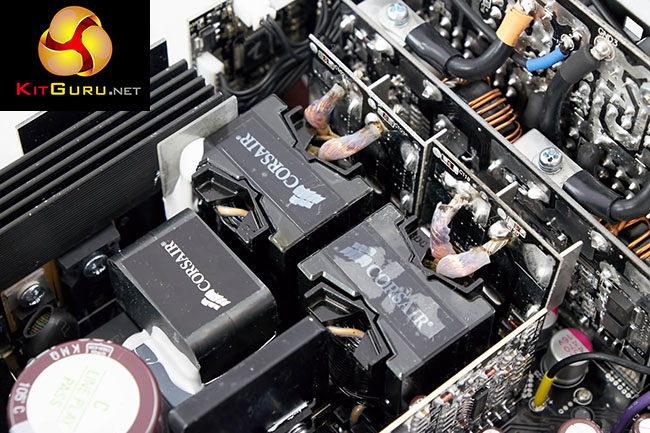
Corsair have been focusing on reducing noise levels as much as possible and we have been impressed with the low noise emissions.
They have incorporated specially modified fluid dynamic bearing fans alongside winding adjustments to other components, helping to reduce any possibility of ‘coil whine'. Some of the Corsair power supplies in the lower end of the market have been particularly susceptible to coil whine, but both HX1000i and HX1200i get a clean bill of health.
Technically, there is little, if anything to fault. Load regulation is solid, and all rails hold within 2% when the unit is fully loaded. The HX1200i also dealt with the cross load test without a problem. When hit hard with 88 AMPS, the +12v rail held at 12.00v.
Ripple suppression is also excellent, although a little behind the latest SuperFlower units, such as design found inside the high end eVGA SuperNova P2 1200 and P2 1600 power supplies.

The pure modular design, high efficiency levels and build quality will appeal to an audience of enthusiast gamers building a high end dual or triple SLI or Crossfire system. The pricing is competitive – Overclockers are selling the Corsair HX1200i for £199.99 inc vat. Budgeting £200 towards a power supply for a high end rig is a wise move … cutting corners here can be a recipe for disaster.
Discuss on our Facebook page, over HERE.
Pros:
- pure modular.
- Platinum efficiency.
- quiet.
- high grade 105c Japanese capacitors inside.
- stable load regulation.
- 7 year warranty.
Cons:
- Corsair face a lot of competition this year from Superflower, Seasonic and others in the high end.
 KitGuru KitGuru.net – Tech News | Hardware News | Hardware Reviews | IOS | Mobile | Gaming | Graphics Cards
KitGuru KitGuru.net – Tech News | Hardware News | Hardware Reviews | IOS | Mobile | Gaming | Graphics Cards

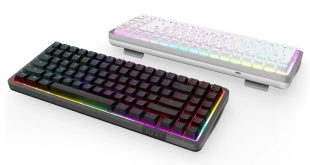
It’s very Simple with pajiba < my neighbor's mom makes $64 hourly on the computer . She has been without work for 6 months but last month her check was $14236 just working on the computer for a few hours.
learn the facts here now SEE MORE DETAIL